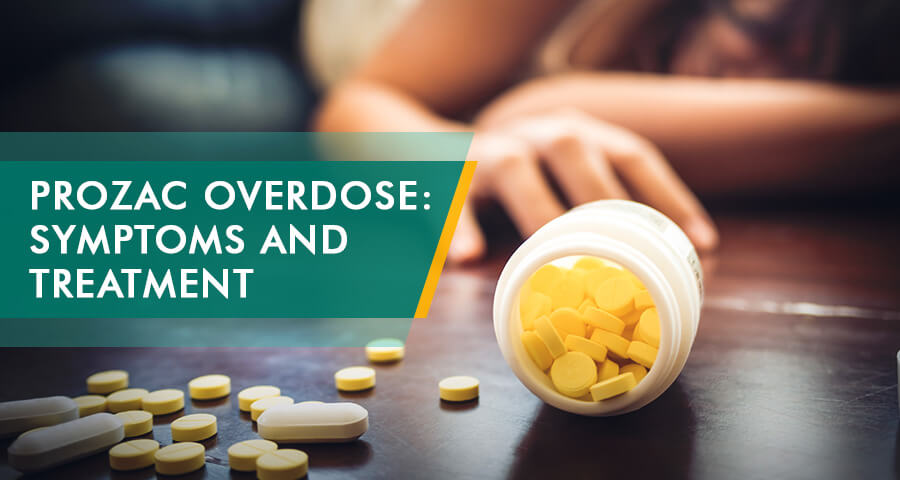
Prozac is one of the most common medications that’s prescribed to patients that are struggling with mental health problems such as depression, anxiety, and obsessive-compulsive disorder, to name a few. Generally, Prozac is prescribed in low, controlled doses. The dose is set according to the patient’s height, weight, and age, so the amount is not heavy enough to harm them. So, what is Prozac overdose? If someone uses a higher dose than they had been prescribed, it’s possible that they can overdose on it on purpose or by accident.
Table Of Contents:
Can You Overdose on Prozac?
In 2016, The American Association of Poison Control reported that there had been over 50,000 cases that had SSRIs mentioned in them. Out of the 50,000, there were 102 fatalities, and in 101 cases, there were two drugs ingested together. The most common combination was Sertraline and Fluoxetine. Another study analyzed 469 cases of SSRI overdose and found that 14% of the patients reported serotonin toxicity.

An overdose can happen because of various factors, and the most popular is taking too much Prozac in a short amount of time. Another risk factor for an OD on Fluoxetine can be mixing it with alcohol or similar substances. One can get overdosed if they take other types of drugs in combination with it. Some of these drugs include isocarboxazid, pimozide, or Thioridazine, which is an antipsychotic drug. Lastly, people who have suicidal tendencies might attempt overdosing on this popular antidepressant, but there are very few cases when taking too much Fluoxetine was actually lethal. Fluoxetine overdoses aren’t necessarily on purpose.
A Person Can Overdose on It Accidentally if They Use It With Any of the Following Substances:
- Any type of monoamine oxidase inhibitor (MAOIs). These are usually antidepressants like isocarboxazid.
- Pimozide, which is typically prescribed to people with Tourette syndrome to help with their ticks.
- Antipsychotic drugs like Thioridazine
- Alcohol
- Phenelzine
- Tranylcypromine
- Rasagiline
- Selegiline
What are the Prozac overdose symptoms?
When a person overdoses on Fluoxetine, the symptoms start very mild but can quickly get severe. It’s essential that someone who takes this drug, or their caregiver, has information about Prozac overdose symptoms so the patient can be rushed to the emergency room before the drug’s effects cause their condition to worsen.
The List Of Prozac Overdose Symptoms Includes but Is Not Limited To:
- Drowsiness
- Blurred vision
- Tremor
- Vomiting
- Fast heart rate
- Breathing hard
- Coma
In some cases, people also hallucinate from Prozac overdose or have uncontrolled muscle spasms lasting for hours. These symptoms can be augmented if Fluoxetine is administered in combination with other SSRI drugs or alcohol, nicotine, etc.
Can Taking Too Much Fluoxetine Cause Complications?
People who are curious about what happens if one takes too much Fluoxetine should know that a Fluoxetine overdose can lead to death in the worst cases. Still, such occurrences are rare if it is appropriately treated. One of the most prevalent complications resulting from Fluoxetine overdose is having trouble breathing, indicating brain damage.
Serotonin Syndrome
Research from 2020 into the interactions of Fluoxetine shows that a Prozac overdose could be more severe (potentially Prozac overdose death) if the patient has mixed it with medications that alter the amount of serotonin in their body. The use of multiple drugs together can cause “Serotonin Syndrome,” which can affect their mental and physical health and cause them to deteriorate rapidly.
Serotonin syndrome consists of a series of symptoms that result from consuming various selective serotonin reuptake inhibitors such as Fluoxetine. Some of these symptoms include increased reflexes, extreme body temperature, agitation, and more.
Factors Affecting the Severity of Complications
The gravity of the complications dramatically depends on how much one has taken, how long Fluoxetine remained in his body, how immediate proper medical treatment was administered, whether the substance has been consumed in combination with other drugs, etc. A common myth is that there are high amounts of fluoride in Prozac, which can cause overdose and health problems, but the myth is false. This antidepressant contains trace amounts of covalent bond fluorine atoms, which are harmless to the human body and cannot cause additional complications.
What to Do in Case of Prozac Overdose?
Some people can develop Prozac addiction, and they have a higher chance of overdosing with Fluoxetine. It is essential to act as quickly as possible if someone gets overdosed with Fluoxetine.
These Are a Few Tips On What To Do If Someone Gets Overdosed:
- Call 911 or the local emergency number.
- Never leave the patient alone until the paramedics arrive and try to keep the patient awake.
- Never attempt to make the patient vomit unless the medical personnel specifically mentions it. Provoking vomit without doctor supervision might lead to choking.
- Find relevant information such as the patient’s medical history, age, height, amount of antidepressant ingested, etc.
How Is a Fluoxetine Overdose Treated?
There are many ways to treat patients who take too much of this antidepressant, depending on when this substance is ingested and other factors. For example, the doctor starts by measuring vital signs such as blood pressure, body temperature, etc. Suppose the patient has ingested a combination of Fluoxetine and alcohol in the last hour. In that case, the doctor might want to provoke vomiting so that the body does not entirely absorb these dangerous substances.

Depending on the amount of drug ingested, doctors might also attempt to administer activated charcoal to the patient. This substance is known for its absorbent properties and can save one’s life if given at the right time. Doctors might also attempt to hydrate the patient intravenously to keep him alive while Fluoxetine is eliminated from the body. In the worst cases, seizure medications might be required to save an overdosed person’s life.
Overdose Treatment Aftercare
Once the patient who suffered an overdose on Prozac has gotten to the emergency treatment and gotten better, before they get back to everyday life, it’s essential to get information about what caused the Prozac overdose in the first place. Was it because they were addicted to Prozac or because it had accidentally been mixed with another substance.
If the overdose’s cause was that they had become addicted to the drug itself, they would have to get treated for their addiction. Suppose they were having symptoms of an anxiety disorder, depression, or suicidal thoughts while being on Prozac. In that case, it’s integral that they let their doctor know so they can switch them to different antidepressants instead.
If Fluoxetine had accidentally been mixed with another substance, they need to make sure that they have the appropriate information on how the drug interacts with others and don’t use the two together again. If the other drug was something they need to take, possibly for something like an anxiety disorder, have their doctor switch out the other medication or Prozac.

All of these preventative measures will work together to ensure that an OD doesn’t happen again in the future to keep the adverse effects to a minimum.
Severe Overdose on Prozac Shall Be Treated in Rehab Facilities
Prozac is generally a safe drug to take as long as the patient only takes the amount their doctor has prescribed. The doses that have been prescribed have been calculated, keeping their body composition in mind. If they end up taking too high of a dose, they put themselves at risk for a potential OD. There’s no antidote for Prozac, so as soon as the first signs of an overdose appear, it’s integral that the patient gets emergency medical attention. Doctors can help stabilize the patient by regularising their vitals and getting the Fluoxetine out of their system as fast as possible to minimize Prozac withdrawal symptoms.
People who have gone through a Fluoxetine overdose can go to rehab centers and facilities to get treatment. Most patients go to these facilities to get treated to make a full recovery.
Hope Without Commitment
Find the best treatment options. Call our free and confidential helpline
Most private insurances accepted
Find Drug Rehabilitation Centers Near You Anywhere In the US
Addiction Resource team has compiled an extensive list of the top drug rehabilitation facilities around the country. Use our locator tool to find the best centers near you.
Page Sources
- Gummin, D. D., Mowry, J. B., Spyker, D. A., Brooks, D. E., Fraser, M. O., & Banner, W. (2017). 2016 Annual Report of the American Association of Poison Control Centers' National Poison Data System (NPDS): 34th Annual Report. Clinical toxicology (Philadelphia, Pa.), 55(10), 1072–1252. https://pubmed.ncbi.nlm.nih.gov/29185815/
- Isbister, G. K., Bowe, S. J., Dawson, A., & Whyte, I. M. (2004). Relative toxicity of selective serotonin reuptake inhibitors (SSRIs) in overdose. Journal of toxicology. Clinical toxicology, 42(3), 277–285. https://pubmed.ncbi.nlm.nih.gov/15362595/
- Sohel, A. J., Shutter, M. C., & Molla, M. (2019). Fluoxetine. StatPearls [Internet]. https://www.ncbi.nlm.nih.gov/books/NBK459223/
- Volpi-Abadie, J., Kaye, A. M., & Kaye, A. D. (2013). Serotonin syndrome. The Ochsner journal, 13(4), 533–540.https://pubmed.ncbi.nlm.nih.gov/24358002/
- Bruggeman, C., & O'Day, C. S. (2020). Selective Serotonin Reuptake Inhibitor Toxicity. StatPearls [Internet]. https://www.ncbi.nlm.nih.gov/books/NBK534815/


 Reviewed by:
Reviewed by:  Written by:
Written by: 

 FindTreatment.gov
FindTreatment.gov